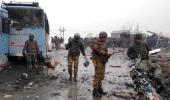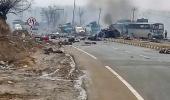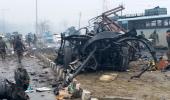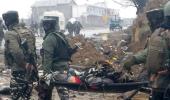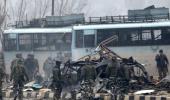'A conventional war is not in fashion today and not seen as being able to deliver the objective.'
'Perhaps surgical strikes that are deeper, this time not on Pakistan's terrorist facilities, but on Pakistan army facilities.'
'The nation has to be prepared for losses.'
'War is not something that can be pussyfooted around.'
'If we go for limited number of posts in Kashmir, these are very difficult posts to capture and very difficult operations.'
'Be prepared for 200 to 300 killed.'
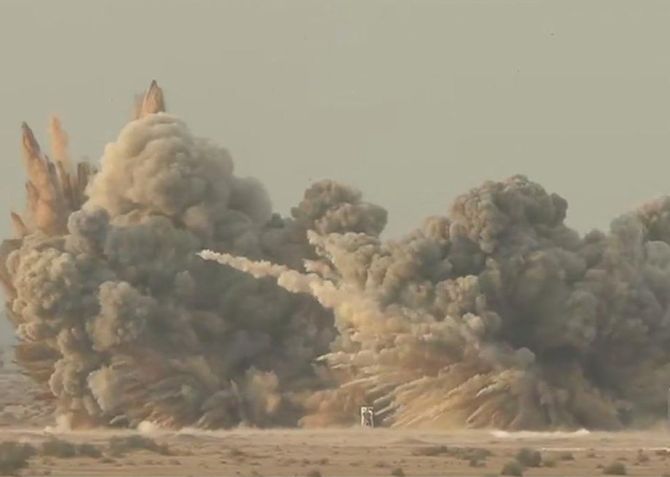
Few people understand the unrest in the Kashmir valley and its intersection with Pakistan-sponsored terrorism as Lieutenant General Syed Ata Hasnain (retd) does.
As commander of the XV Corps based in Srinagar, General Hasnain conceived the 'Hearts Doctrine' in Kashmir. The general has been hailed for 'the balance he brought between the employment of hard power in counter infiltration and counter terrorist operations and military soft power.'
"If Kashmiri students are going to be threatened in universities and cars of Kashmiris are being burnt in Jammu, that is not going to help us with what we wish to do across the border. Then, what is going to happen is that unlike 1965 and 1971 when the Kashmiri population was with the army and you did not have to look over your shoulder for the security of your convoys and garrisons, this time the army will feel more threatened in Kashmir on internal security -- the army will be looking rearward half the time!" General Hasnain tells Rediff.com's Archana Masih in the aftermath of the Pulawama attack on February 14, 2019.
What are the options that India can exercise against Pakistan?
There are both soft and hard options.
Soft options are in the diplomatic realm, both political and economic.
The government has already got its diplomatic machinery into action. Reactions like what came from US National Security Adviser John Bolton have been very positive.
It is important to have ongoing diplomatic pressure. We are very good at one time diplomatic pressure. We have embassies in the important capitals of the world, but our political presence is not felt internationally in the way it should.
I am going to London to speak at IISS (the International Institute for Strategic Studies) on Kashmir. For the first time in 5 years they are having a session on Kashmir.
You find the Pakistani presence and point of view in every other think-tank in London. The Pakistan political community, many of whom are citizens of the UK, are in overdrive to cultivate Kashmir into the minds of the British. This is something we never do.
There are important think-tanks in the USA, but where is the Indian voice there? I feel our diplomacy is concentrated towards only one time diplomacy when what is needed is ongoing diplomacy.
Economic: We have taken baby steps by withdrawing MFN (Most Favoured Nation) status. There is some threat emanating on the Indus Water Treaty. But we are hardly in a position to control the waters of the Indus.
It is difficult because we have to have the capability to divert, absorb etc. But it provides a good psychological leverage that India can look at choking the water supply.
And what are the hard military options?
It is very important to first set your house in order. In the army we have a system that if you go on an offensive the base from where you are launching your offensive has to be very strong.
There has to be political consensus and it is good to see temporary political consensus. We have to demonstrate a progressive political consensus on Kashmir and on national security.
Even more important is to demonstrate political consensus in J&K.
If Kashmiri students are going to be threatened in universities and cars of Kashmiris are being burnt in Jammu, that is not going to help us with what we wish to do across the border.
Then, what is going to happen is that unlike 1965 and 1971 when the Kashmiri population was with the army and you did not have to look over your shoulder for the security of your convoys and garrisons, this time the army will feel more threatened in Kashmir on internal security -- the army will be looking rearward half the time!
This aspect has to be strengthened first before the other military options.
What is the level of the military offensive that can be launched?
It can be from low to high end.
High end military option is all out war. I don't think we are looking at an Op Parakram situation, we are not looking at a general mobilisation of our strike corps.
In today's time, the world will not support it. A conventional war is not in fashion today and not seen as being able to deliver the objective.
Then what kind of military action can deliver the objective?
A slightly lower end military action like special operations.
Surgical strikes that are deeper, this time not on Pakistan's terrorist facilities, but perhaps on Pakistan army facilities.
If we hit Pak army bases along the Line of Control and capture 4/5 major posts dominating certain areas, Pakistan won't be able to deny it and be forced to respond.
What would be the scale of Pakistan's retaliation to such a strike?
A response restricted to J&K is manageable.
Pakistan will never use tactical nuclear weapons inside Kashmir because that will go against the idea of support to Kashmiris.
That is a place where the Pak response options are comparatively limited. They don't have enough troops for that.
We have a strong presence inside J&K. With our resources in J&K and with some additional resources we can go for selected punitive actions against certain posts and pickets which we should capture and integrate into our side of the Line of Control system.
What are the chances of this spreading to neighbouring Indian areas to the west?
We should be prepared for it spreading into the plains and the International Border, but I doubt that Pakistan would wish to do that because that is to their disadvantage.
We have to keep in mind the threat from China. It will make noises, but not do more than that. It will play out psychological and cyber warfare in a very big way.
What about an air borne offensive?
It doesn't have to be general air strikes against air fields etc, but across specific targets.
Pakistan will respond if India launches air strikes.
A lot is being discussed in the media about Bahawalpur (where the Jaish e Mohammed headquarters are based) and Muridke (where the Lashkar e Tayiba headquarters are based), these are the objectives one must look at.
A limited offensive will also result in losses for the Indian side.
The nation has to be prepared for losses. War is not something that can be pussyfooted around.
If we go for limited number of posts in Kashmir, these are very difficult posts to capture and very difficult operations.
Be prepared for 200 to 300 killed.
That is where the government has to ensure that it works on the system and prepares the people for it.
Air strikes escalate the offensive and are responded to by hard force. Does not this have the potential to result in a full scale war?
An all out war is classified as a non thinking war. It means putting all your military, economic, maritime resources.
Be prepared for everything, but start small and do it smartly.
Use diplomatic initiative, think of going to the extent of threatening Pakistan that we will starve you of the water of the Indus.
What are our capabilities for conducting covert operations?
No one can be certain of what India's covert capabilities are.
If it is covert, then it will have to be something deeper, looking for specific leaders and institutions etc.
That is an option, but I don't know if we have the capability to execute it.
How can the vilification of Kashmiris be curbed in these emotionally surcharged times?
Political consensus must emerge about sending appropriate messages. Unless cadres of the party down below are controlled and unless they are looking at consensus, there can really be no consensus.
These are primarily right wing groups. The university authorities are quiet, they don't have security, the police is not doing much.
They should have anticipated the trouble in Jammu, but the administration was not prepared.
Kashmiris have a great memory and they remind you of all this.
Indoctrination and defeating an ideology is a task that takes a number of years, how can the Kashmir youth be de-radicalised?
One of the experiments that has not been tried is the proactive role in bringing in the clergy.
Start small, in 2 or 3 villages. Bring well considered, respected elders from the clergy to speak messages of peace and the right virtues of Islam.
King Abdullah of Jordon has done this in Amman. He got Muslim scholars from all over the world and did the Amman message. Every sect of Islam was represented. Google it, it is a beautiful message.
Why can't we experiment with this? When he came here last year, there were 500 members of the Muslim clergy who attended the function at Vigyan Bhavan and he spoke the same message that day.
If you can get 500 clergy all together for a function like this, can't you get 50 to listen to the PM, the home minister?
Pay them money to come, win them over. Tell them it is your job primarily to preach the correct virtues of Islam to the wayward.
You have to create the grounds for it.
Alienation is 100% worse now than 2010-2012. The worst contributor to this is social media.
What kind of equipment is required for a short offensive?
An air attack does not require many aircraft. Four aircraft can be deployed for bombing. It may not result in killings, but will destroy facilities which has great messaging.
Simultaneously, doing 1 or 2 raids on Pakistani posts across the LoC at 2 or 3 major company level posts attacked by a brigade strength or so.
This will entail committing a division size of about 20,000 men.
It needs basic equipment already held by the army -- artillery, basic infantry and some missiles.
What response will such a strike generate?
They will strike 1-2 of our posts. We are much stronger and should be able to hold on to the posts.
We should integrate the areas we capture into our defences. Pakistan can't do it for an extended period because it has limited resources including financial resources.
You have to give the message that we will keep hitting you.
How has the manual for terror changed in J&K with the use of a vehicle-borne suicide bomber?
Lessons have been learnt from Afghanistan, Syria, Iraq and Pakistan.
Capabilities of converting it into threats for the nation has enhanced tremendously. Pakistan has revisited those lessons and brought them back to the valley.
It is difficult to make car bombs and even more to deploy them. This car bomb is going to put everyone on caution mode.
More resources will be deployed for defensive purposes and there will be more population control methods.
There will be many car check points, people will get inconvenienced with the intervention in their lives. This will impact people's lives and add to the alienation and that is what Pakistan wants.
The whole idea is to put you in a Catch 22 situation.
